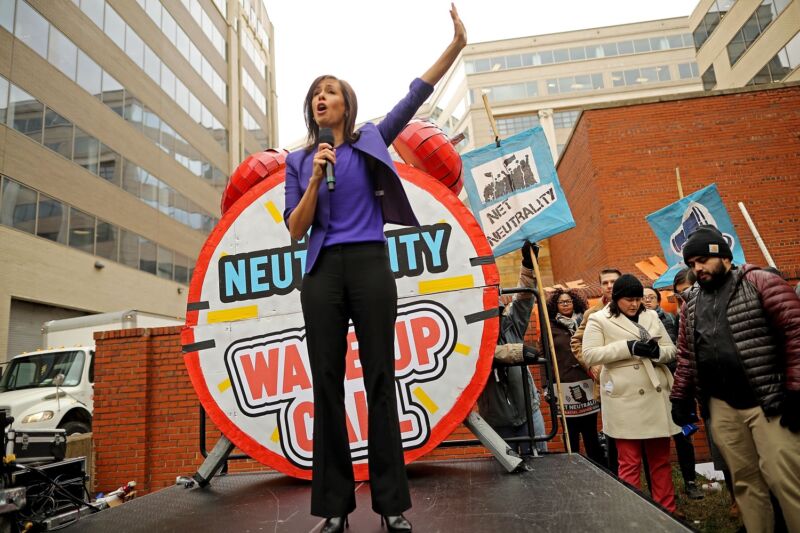
Federal Communications Commission Chairwoman Jessica Rosenworcel today announced plans to restore net neutrality rules similar to those that were adopted during the Obama era and then repealed by the FCC when Donald Trump was president.
Rosenworcel announced her plans in a speech today, one day after the FCC gained a 3-2 Democratic majority with the swearing-in of Commissioner Anna Gomez. The FCC previously operated with a 2-2 partisan deadlock because the US Senate never voted on whether to confirm President Biden's first nominee, Gigi Sohn.
"This afternoon, I'm sharing with my colleagues a rulemaking that proposes to reinstate net neutrality," Rosenworcel said.
The net neutrality rules would prohibit Internet service providers from blocking or throttling lawful Internet traffic and from selling "fast lanes" that prioritize some traffic over others in exchange for payment. Similar to the previous rules, FCC officials said they don't plan to impose rate regulation or "unbundling" requirements that would force broadband providers to share networks with other companies.
In a fact sheet, the FCC said the proposal would "establish basic rules for Internet Service Providers that prevent them from blocking legal content, throttling your speeds, and creating fast lanes that favor those who can pay for access."
Vote next month
The first step for the FCC is to vote on a Notice of Proposed Rulemaking (NPRM) that will seek public comment on the rules. The vote on the NPRM is scheduled for October 19. Based on past practice, it will take at least a few months to gather public comments, analyze them, and then propose and adopt final rules.
"We will need to develop an updated record to identify the best way to restore these policies and have a uniform, national open Internet standard," Rosenworcel said.
Rosenworcel, a commissioner since 2012, criticized the Trump-era FCC's decision to stop regulating broadband as a common carrier service. She pointed out that the rules were upheld in court and popular with the public, and that the repeal was met with an overwhelming public backlash.
"As a result of the previous FCC's decision to abdicate authority, the agency charged with overseeing communications has limited ability to oversee these indispensable networks and make sure that for every consumer, their access is fast, open, and fair," she said.
Just like the Obama-era rules
Rosenworcel's proposed rules will mostly mirror those approved under then-Chairman Tom Wheeler in 2015, senior FCC officials said in a call with reporters today. The proposal would classify broadband providers as common carriers under Title II of the Communications Act, providing the legal authority to impose net neutrality rules and other regulations.
Broadband providers are likely to argue that rules aren't necessary because they've behaved themselves in the five years since the previous net neutrality order was repealed in 2018. To counter that argument, FCC officials today pointed out that ISPs are required to follow net neutrality rules in individual states even though the federal government doesn't have uniform rules for the whole country.
Then-Chairman Ajit Pai's attempt to preempt all state net neutrality rules was rejected in court. California enforces net neutrality rules that mirror what the FCC adopted in 2015 and beat industry attempts to get the state law overturned.
FCC officials said today that nearly a dozen states enforce net neutrality through state laws, government contracting policies, or executive orders. While they stressed the importance of having a strong set of rules for the entire US, they said ISPs are already subject to a "patchwork" of state laws.
FCC officials today said the reclassification of broadband will close a national security "loophole." They said the FCC relies on its authority over voice service to keep hostile foreign actors from compromising networks and that regulating broadband under Title II will provide additional power to impose cybersecurity requirements on network operators. That includes blocking authorizations of companies controlled by adversarial governments, they said.
More than just net neutrality
Rosenworcel stressed that placing broadband under Title II classification will give the FCC stronger authority over more than just net neutrality. For example, the FCC can use Title II to require Internet providers to address long outages and report detailed data on outages, she said.
The FCC fact sheet said Rosenworcel's plan will let the agency "enhance the resiliency of broadband networks and bolster efforts to require providers to notify the FCC and consumers of Internet outages."
Rosenworcel also pointed to the 2018 incident in which Verizon throttled a fire department's "unlimited" data during California wildfires. "As a result of the Title II repeal, the FCC didn't have any authority to intervene and fix it," Rosenworcel said.
Rosenworcel said that because FCC authority is generally centered on phone systems instead of broadband, the commission often needs "duct tape and baling wire" to provide legal justification for its rules. Among other things, Title II would give the FCC stronger authority to fight robotexts in the same way it fights robocalls, she said.
Title II also has benefits for broadband providers, like giving cable companies rights to attach wires to telephone poles, she said. The FCC's Title II repeal "eliminated the pole-attachment rights of broadband-only providers," she said.
reader comments
185